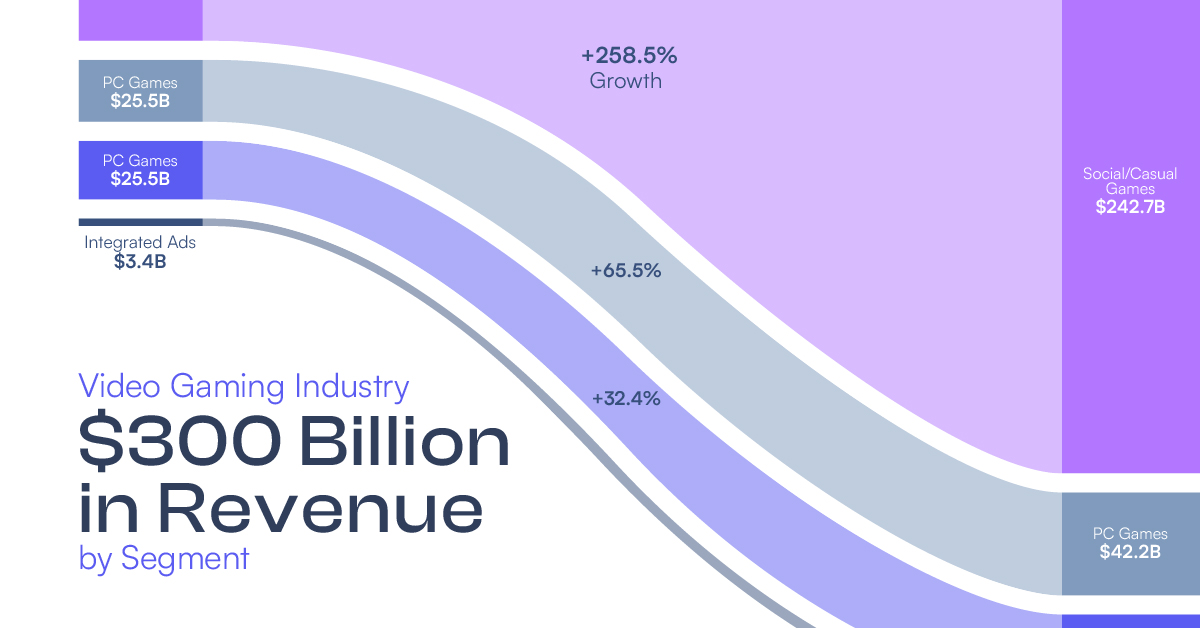I‘m not questioning the data, but this whole „article“ is advertising to sell an ETF to invest into this trend.
The data is misleading, it only shows data from 2017 and then a projection. Sure, one that’s pretty reasonable (other sources have similar numbers) but still anything could happen.
I wonder to what extent gambling addiction is fueling the growth of casual/social gaming.
Loot boxes in video games have been linked to problem gambling.
Candy Crush is using a strategy that is “known as a variable ratio schedule of reinforcement and is the same tactic used in slot machines”.
Honestly, this should have been outlawed long ago.
It is an absolute sham that they aren’t regulated as strictly as casinos, exclusively for adults, with the company liable if they fail to prevent minors from participating.
It’s just idiotic. Even more idiotic is the idea that we cant change these things. Dump letters on the government, pressure them, make groups to fight for this, and if that’s not enough, protest. It’s a minor change that will only have positive consequences. Why won’t we do it? (Spoiler: because it is easier to think nothing can be done)
“Around 85% of all video games revenue comes from free to play games”
We really are the problem. They wouldn’t add all these microtransactions and manipulative payment methods if we didn’t sucker up.
We are the problem in so much it’s very well known that psychologically conditioning tactics work on the human brain.
The real problem is a lack of education and regulation. People know regular casino gambling is a problem but governments act to make people aware and limit its harm. Meanwhile even rating agencies play coy about the effects of lootboxes in games rated for actual children. They try to argue that it’s not “real gambling” because players can’t officially redeem rewards as money, but it’s exactly the same as far as the negative effects go, incentiving compulsive spending which can be financially damaging.
I’m not sure there is much intersection between PC & console gamers and social/casual gamers.
I can’t speak for anybody else, I guess, but neither I nor any gamers I routinely interact with play these freemium/social/mobile type games. Like, at all.
I think that looking to ourselves and our habits for answers will not tell us much, as those gamers are not in our sphere of influence.
I meant the collective “we” as in humanity. You are an outlier among gamers I assure you, the vast majority are just “normies”.
I’m not drawing some elitist lines between hardcore and casual, I’m saying that the “video gaming revenue” graph is fundamentally defective because it’s lumping together genuinely different enterprises, with different audiences, marketing, and revenue models
Half of the data is made up and from the future
Expecting growth to keep up forever is investor nonsense, but it is very relevant that, up to 2021, mobile games which are largely based on the freemium model have overtaken the rest of the industry by far. Console and PC games are now a secondary market, which is sad to see.
It’s the same for piracy, you can’t expect people that don’t have the money to play games that they have to pay for. Nothing beast free when you just have a phone or chrome book and download a game or play embeded after watching ads. The graph didn’t tell you where the money come from or the avg dollar spend per player.
The graph and tables are for total revenue across the industry and they even separate ad revenue into a different category. What this shows is that freemium is more expensive than paid at this point.
I think it’s simply a matter of volume. Everyone has a phone, not everyone has a console or gaming pc
There is some merit to that but we aren’t just counting players. People seem to be ultimately paying more. If mobile gaming was more available but also more affordable the revenue might not surpass console and PC games.
Which is no surprise, since most freemium games are structured to get players spending, dangling extra lives and new characters in front of them, often escalating to the point where even people grinding hours every day struggle to advance without paying. It’s not uncommon to see people in mobile gaming communities saying how they spent thousands of dollars on a game and regretting it, something that is not even a possibility for console games without microtransactions.
Yeah, like why the fuck isn’t it at least split in the middle with present data. The whole thing is just a garbage ad.
and that folks, is why the gaming industry is not only in such an dystopian god awful state, but it only goes down from here, there aint no bottom
I spend a hundred quid or so, every year for the last ten years on Steam (Steam for Linux onwards), but in exchange for that, I have several hundred quality games - probably more than I can ever play in my lifetime.
How are people spending so much on imaginary gold rings for “Sweetshop Diamond Solitaire Saga Origins”?
Is it simply a matter of there’s 100 of them for every 1 of me?
My guess is either gambling addiction or money laundering.
So PC gaming is a niche market now wonderful /s
On one hand I accept casual gamers but on another hand I don’t want people to stop making non-casual games, so seeing casual games make much more money is a little alarming. I also don’t want casual gamers to get flooded with freemium trash that’s padded to the gills with microtransactions. They deserve more Animal Crossing and less Slot Machines Disguised As A Game.
Kinda confusing how the amounts go up but the shape of the chart goes down
Yeah, I feel like just flipping the chart would make it make more intuitive sense. I do like the choice of colors at least.
These “categories” are only superficially the same thing. Here’s what social/casual games and PC/console games have in common:
- Both show (usually) moving images to a player
- Both accept input that is (usually) reflected through an impact on the game’s outcome
Here’s a couple of things that are very different:
- social/casual games monetize by letting you pay to make the game less bad or by preying on psychology. PC/console games monetize by dangling the promise of some kind of experience you couldn’t otherwise have.
- social/casual games are useful for destroying time. PC/console games are useful to stoke imagination and elicit emotions.
I know I’m being reductive here, but I think the point is valid. They’re superficially the same but used for very different purposes. Putting them side-by-side on a chart like this is like comparing revenue across all car makers and determining that, because McLaren made $280 million in 2020 while Kia made $44 billion, sports cars are going away soon.
If McLaren did go away, the McLaren driver is not going to replace the McLaren with a Kia, because those are not the same thing, even though they are in the same way that a pair of scissors and a Hattori Hanzo sword are both blads, or maybe in the same way that both brass knuckles and a bazooka are weapons even though one cannot replace the other. If Baldur’s Gate 3 were never released, I wouldn’t have dumped my $60 into Fortnite skins because I’m looking for something particular out of a game. My goal isn’t just to burn $60 on anything that shows me moving pictures and maps my inputs onto those pictures. Those attributes of a video game may be what make it a video game, but they aren’t the attributes that will make me enjoy it or want to spend money on it.
If McLaren and all sports car makers go away, most of the money spent on those is not going to funnel into compact cars. It’s going to stay in people’s pockets. $280 million dollars doesn’t hold a candle to $44 billion… but someone is going to want to take that $280 million! So, someone will probably keep making sports cars… just like someone will probably keep making the games that will take the remaining ~$73 billion slice of the video games pie.
Some public companies may jump ship to chase the social/casual dollars… but these are the companies that have been trying to blur the lines anyway (think EA), so we’re really not losing much. The talent who delivered PC/console games we used to enjoy from EA have mostly moved on to other studios or to form their own studios so they can keep making what they like.







